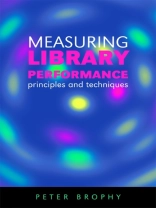Measuring the performance of a library’s services is a crucial part of good library management, since without a firm grasp of what is actually being achieved it is impossible to move forward to improved service. The key measure is no longer size and quality of bookstock, but the impact of staff effort and resources on the population the library is intended to serve. Analysing this enables evidence of benefits to be presented, providing the ultimate justification for the service’s existence. This important book is the first to provide an accessible account of current thinking and research on the evaluation of library services, both traditional and – importantly – electronic. Illustrated throughout with a range of internationally based examples across the different library sectors, it is structured to focus primarily on the intended service user (outcome and impact perspectives), then to look at service management (output and process issues) and the building blocks of services (inputs), and finally to draw together these strands by examining some of the broader frameworks for evaluation that have emerged. Each chapter features a list of key resources, and the extensive appendices offer practical guidance on data collection methods, the analysis of data and the presentation of results. The key areas addressed include: background and theoretical considerations; user satisfaction and impact on users; social and economic impact; inputs, processes and outputs; staff and infrastructure; services for all; and, standards, benchmarking and the balanced scorecard. The emphasis on both principles and techniques in this book means that it is perfect reading for busy LIS practitioners but it is also eminently suitable for LIS students and researchers trying to get to grips with this complex area.
Spis treści
1. Background 2. Theoretical considerations 3. User satisfaction 4. Impact on users 5. Social and economic impact 6. Inputs 7. Processes 8. Outputs 9. Staff 10. Infrastructure 11. Services for all 12. Benchmarking 13. The balanced scorecard 14. Standards Appendix 1. Data collection methods Appendix 2. The analysis of data Appendix 3. The presentation of results.
O autorze
Peter Brophy BSc Hon FCLIP FCLIP FRSA ILTM is Professor of Information Management in the Department of Information and Communications at Manchester Metropolitan University, where he is also Director of the Centre for Research in Library and Information Management (CERLIM).












